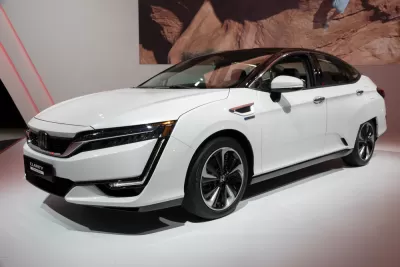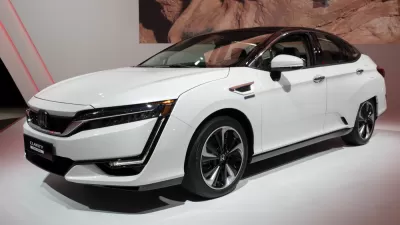Fuel cell electric vehicles are gaining a following in California, but nowhere else in the U.S. for the simple reason that almost all hydrogen fueling stations are located in the Golden State. Sales, or leases, are expected to jump this year.

This electric car can go 366 miles and refuels as fast as any gasoline powered car. The Honda Clarity Fuel Cell has no plug though.
While many call them fuel cell vehicles, technically they are referred to as fuel cell electric vehicles—and they do run on electricity created by a fuel cell and compressed hydrogen gas (H2) and oxygen from the ambient air. Battery electric vehicles (without gas tanks) and fuel cell electric vehicles are the only two types of vehicles that qualify as Zero Emission Vehicles by the California Air Resources Board.
[Note: In California, any new vehicle in 2020 or later that doesn't run on gasoline or diesel will be classified as a ZEV for the purpose of paying a new $100 annual Road Improvement Fee per the Road Repair and Accountability Act of 2017. See SEC. 47. Section 9250.6 – (g) in SB 1.]
Dee-Ann Durbin , auto writer for The Associated Press, reports that leases of fuel cell vehicles by Honda, Toyota and Hyundai will increase to over 1,000 this year from a few hundred over the past three years.
Fueling Stations
According to the U.S. Department of Energy's Alternative Fuels Data Center, there are 34 hydrogen fueling stations in operation in the U.S.: 31 in California, and one each in Massachusetts, Connecticut, and South Carolina as of April 13, 2017. See California Fuel Cell Partnership map for locations, be they operating, under construction, or planned; and whether they serve the public.
Sales of FCEVs amounted to just over one thousand last year, compared to nearly 80,000 electric vehicles, according to WardsAuto, reports Durbin. According to Andrew J. Hawkins, transportation reporter for The Verge, "[t]the main reason is that the hydrogen-fueling infrastructure is practically nonexistent."
According to the California Air Resources Board's "DriveClean" webpage on Fuel Cell Vehicles, "(b)y 2020, automakers expect to place tens of thousands of fuel cell electric vehicles in the hands of California consumers."
For the latest on each auto manufacturer's plan for FCEV development and commercialization, visit the following websites:
FULL STORY: Hydrogen fuel cell cars creep up — slowly — on electricity

Planetizen Federal Action Tracker
A weekly monitor of how Trump’s orders and actions are impacting planners and planning in America.

San Francisco's School District Spent $105M To Build Affordable Housing for Teachers — And That's Just the Beginning
SFUSD joins a growing list of school districts using their land holdings to address housing affordability challenges faced by their own employees.

The Tiny, Adorable $7,000 Car Turning Japan Onto EVs
The single seat Mibot charges from a regular plug as quickly as an iPad, and is about half the price of an average EV.

As Trump Phases Out FEMA, Is It Time to Flee the Floodplains?
With less federal funding available for disaster relief efforts, the need to relocate at-risk communities is more urgent than ever.

With Protected Lanes, 460% More People Commute by Bike
For those needing more ammo, more data proving what we already knew is here.

In More Metros Than You’d Think, Suburbs are Now More Expensive Than the City
If you're moving to the burbs to save on square footage, data shows you should think again.
Urban Design for Planners 1: Software Tools
This six-course series explores essential urban design concepts using open source software and equips planners with the tools they need to participate fully in the urban design process.
Planning for Universal Design
Learn the tools for implementing Universal Design in planning regulations.
Smith Gee Studio
City of Charlotte
City of Camden Redevelopment Agency
City of Astoria
Transportation Research & Education Center (TREC) at Portland State University
US High Speed Rail Association
City of Camden Redevelopment Agency
Municipality of Princeton (NJ)




























